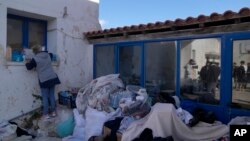A failed engine and high waves were to blame for the fatal shipwreck that killed at least 18 Europe-bound migrants off the coast of Greece last week, one survivor tells VOA.
Speaking to VOA Somali by phone, Mustafa Farah, a survivor from Somalia in his 20s, said about 50 migrants were traveling on an overloaded boat that departed Izmir, a city on Turkey’s Aegean coast, the evening of October 5, bound for Greece.
“As we traveled under cover of night, strong winds swept the Aegean Sea, and the tragedy started to appear when the engine of the boat ... failed,” he said. “We floated for hours in the sea. The waves were too high. About three meters,” Farah said.
According to Farah’s account, late that same night, the flimsy rubber raft crashed on a rocky tip of Greek shores and disintegrated just a few hundred meters off the coast of Lesbos, on the easternmost rim of Greece.
“By late Wednesday, the same night we set out from Turkey, the vessel was swept into a rocky inlet and the tragedy happened,” Farah said.
The sinking sparked a dramatic overnight rescue effort as island residents and firefights pulled the shipwreck victims to safety up steep cliffs.
Some survivors and the dead bodies of the Somali migrants were taken to Mytilene, the capital of Lesbos.
Farah said one boy and 17 women died in the accident. He said another 30 people, including 13 men and 17 women, survived.
Hamza Mohamed Ismail, a Somali refugee in Mytilene who saw the migrant bodies, speaking to the VOA Somali service, gave slightly different totals, saying a 14-year-old Somali boy and 20 women were among the dead.
Ismail says the survivors he saw, most of them young women, were in a full state of shock and could not immediately talk about what happened.
The Associated Press reported that the coast guard on Greece’s eastern island of Lesbos said the bodies of 16 young African women, a man, and a boy were recovered after a dinghy carrying about 40 people sank.
Coast guard officials added that 25 people were rescued by late Thursday.
In a separate incident, another boat packed with migrants sank off the Greek coast the evening of October 5, killing several other migrants. Dozens of people from that boat remain missing.
The sinkings are the deadliest in recent years and the tragedies add to rising tensions between NATO allies Greece and Turkey over the safety of migrants at sea, with Athens accusing its neighbor of failing to stop smugglers active on its shoreline and even using migrants to apply political pressure on the European Union.
Turkey denies the allegations and has publicly accused Greece of carrying out reckless summary deportations, known as pushbacks.
Most migrants who reach Greece travel from nearby Turkey, but smugglers have changed routes — often taking greater risks — in recent months to avoid heavily patrolled waters around eastern Greek islands near the Turkish coastline.
Speaking at the United Nations General Assembly last month, Turkish President Recep Tayyip Erdogan accused Greece of “turning the Aegean Sea into a graveyard."




